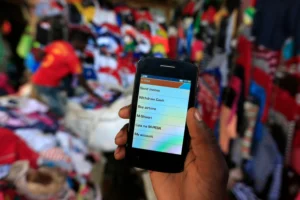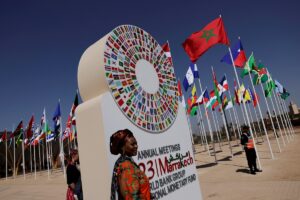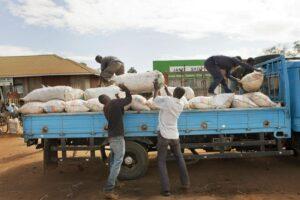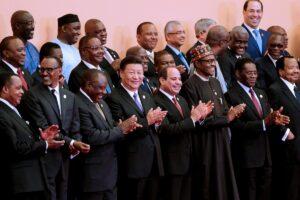- Africa’s new dawn: the rising role of digital and AI in agriculture
- Can Dangote Refinery Transform Africa Energy Ambition
- Gallup Survey: 80 per cent of Kenyan Workers Are Disengaged and Seek New Opportunities
- Madagascar Man Freed from 5KG Tumor After 15-Year Struggle
- How women in Africa are perceived and treated
- Sugar consumption in Kenya to Increase to 1.23 Million Tonnes
- Can Somalia and Turkey Oil deal Bring Change in Somaliland
- Remittances to Kenya dropped to $371.6 million in June, marking a six month low
Banking
- Kenyan Banks Hit by fresh $1.2 Billion Bad Loans in 2023 according to a new report by the Central Bank of Kenya
- The regulator says it is concerned by the sharp rise in bad loans and is working closely with lenders to mitigate the crisis.
- Kenyan banks hit by fresh $1.2 billion bad loans as global interest rates remained high throughout the year.
The high cost of living due to weak currency and shakeups in the global supply chain saw banks suffer an additional $1.2 billion (Sh150 billion) in bad loans in 2023, pushing the total to $4.98 billion (Sh651.8 billion).
The Banking Supervision Report by the Central Bank released Thursday shows the deterioration in banks’ asset quality was the highest in the past five years and almost 30 per cent compared to the previous year. The gross non-performing loans for 2022 were $3.85billion (Sh503.2 billion).
Non-performing loans were concentrated …
- Central Bank of Kenya says active mobile subscriptions hit 66.8 million by December 2023 compared to 65.7 million a year earlier.
- Increasing usage of mobile money saw the banking industry in Kenya experience a drop in the value of banking transactions via bank agents to $10.5 billion.
- Kenya is a trailblazer in the adoption and usage of mobile money across Africa.
A steady rise in the use of cashless transactions as well as the opening of 8,555 new mobile money agent shops in Kenya drove the value of mobile money transactions up by 13.8 percent to record KSh788.35 billion or $6 billion in 2023.
Kenya has been a trailblazer in the adoption and usage of mobile money across Africa since the launch of pioneer cash transfer platform M-PESA by Safaricom PLC in 2007.
“Amidst the increasing adoption of technology and the widespread use of mobile phones in daily life, coupled …
- Kenya’s bilateral loans data show that the Asian giant is still a major lender to Kenya mainly for the development of roads rails and port infrastructure.
- The country’s debt as of March 2024 comprised of $80.9 billion (Sh10.4trillion) comprising $40.5 billion (Sh5.2 trillion) domestic and same amount in external loans.
- In the past three months the strong shilling has come in handy in helping the state reduce its debt.
Kenya owes China $7.2 billion (Sh920.52 billion) in loans making it the leading lender by country rankings, even as President William Ruto looks west for more financing and trade cooperation.
Official data shows the Asian giant is still a major lender to Kenya mainly for the development of roads rails and port infrastructure.
It is the second biggest majorl lender after the World Bank, whose credit line to Kenya is currently at an estimated $14 billion (Sh1.8 trillion)
The country’s debt …
In the ever-evolving world of global finance, oil-rich Saudi Arabia is emerging as a pivotal thread, weaving a narrative of economic collaboration and strategic partnerships. As the Saudi Fund for Development (SFD) unfurls its wings, it has inked a historic $580 million loan agreement with 12 African countries, marking a significant stride in the kingdom’s expanding role on the world financial stage.
Against the backdrop of evolving dynamics, where traditional financiers, especially China, are reassessing their commitments, Saudi Arabia’s ascent becomes a compelling tale of financial diplomacy, poised to reshape the contours of international economic relations. Saudi Arabia is positioning itself not just as a regional powerhouse but as a global player influencing the trajectory of world finance.…
- TransUnion survey shows four in 10 (41%) of Kenyan consumers reported a decrease in income over the past three months.
- A similar number or 42% of Kenyan consumers anticipate being unable to pay their current bills and loans in full.
- About 55% of Kenyan consumers plan to make further cuts to their discretionary spending. What’s more, 47% expect a decrease in large purchases such as cars.
A new survey by TransUnion has revealed a mixed financial outlook for Kenyan consumers in the second quarter of 2023. The research, presented at its annual Financial Services summit in Nairobi, found that while eight in 10 (79 per cent) expect their household incomes to increase in the coming year, four in 10 (41 per cent) reported a decrease in income over the past three months. A similar number or 42 per cent anticipate being unable to pay their current bills and loans in …
- The AfDB and the African Guarantee Fund have unveiled a fresh plan to enhance the financial inclusion of women in Nigeria’s economy.
- The duo have opened the AFAWA Finance Series Nigeria, part of the AfDB’s Affirmative Finance Action for Women in Africa (AFAWA) initiative.
- AFAWA Finance Series Nigeria will explore ways of enhancing the regulatory frameworks that can boost access to finance for women entrepreneurs.
Africa has the highest number of female entrepreneurs across the globe. However, the biggest obstacle they encounter is limited access to finance. Although access to financing poses a challenge to all small and medium enterprises, women-owned businesses are notably at a disadvantage.
It is estimated that the financial gap facing women entrepreneurs may reach up to $50 billion. This can be attributed to several factors, including deep-rooted social and cultural norms. These norms have historically restricted women’s ownership rights of assets that could serve as …
Climate finance by Multilateral Development Banks (MDBs) for low-income and middle-income economies hit a new record of $60.7 billion in 2022. The amount was 46 per cent higher than the 2019 levels, a new joint report by the lenders shows.
In terms of usage, $38.0 billion, or 63 per cent, went into projects helping mitigate the rising threat of climate change. Another $22.7 billion, or 37 per cent, went into supporting climate change adaptation initiatives. Overall, the portfolio of private finance mobilised in the period stood at $16.9 billion, the report said.…
The International Monetary Fund (IMF) has thrown its weight behind a call by the African Development Bank (AfDB) Group urging African nations to stop borrowing loans primarily secured by their natural resources.
IMF Managing Director Kristalina Georgieva met with Dr. Akinwumi Adesina, the President of the AfDB Group, in Abidjan, Cote D’Ivoire. This meeting marked the first time an IMF head visited the Bank headquarters since its establishment in 1964.…
The loan market in Kenya’s banking sector is going through one of its toughest periods in nearly two decades. With interest rates on the rise and a challenging economic environment, many borrowers—individuals and businesses—are finding it hard to meet their loan obligations.
According to the most recent data from the Central Bank of Kenya (CBK), the proportion of loans that are not being repaid, known as non-performing loans (NPLs), reached 15.0 percent in August 2023, up from 14.2 percent in August 2022. This represents more than $4 billion (Ksh596 billion), the highest it has been in 18 years. The last time Kenya experienced such a high level of loan defaults was back in 2005, when it reached nearly 30 percent.…

























